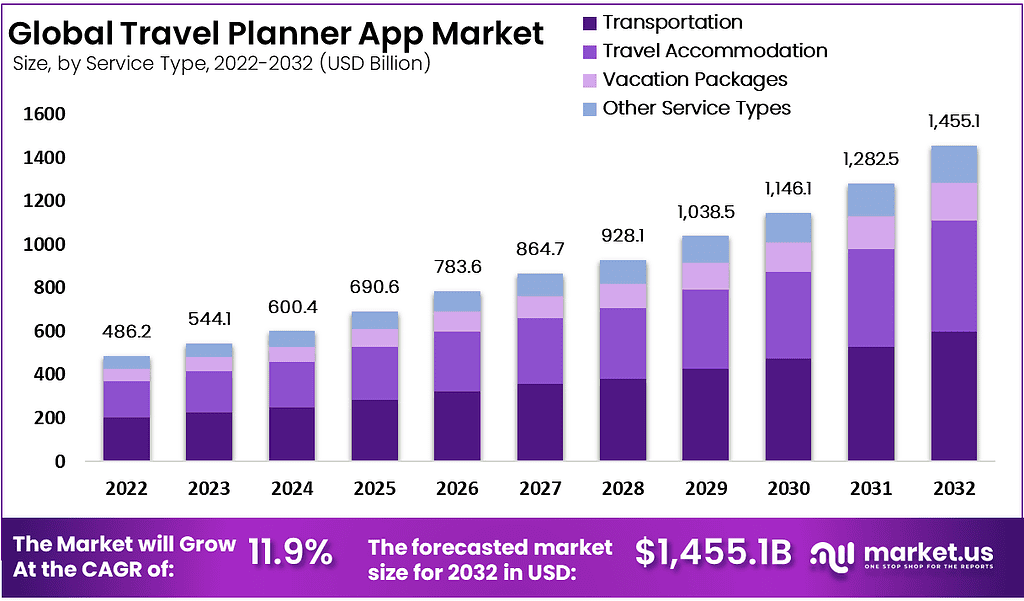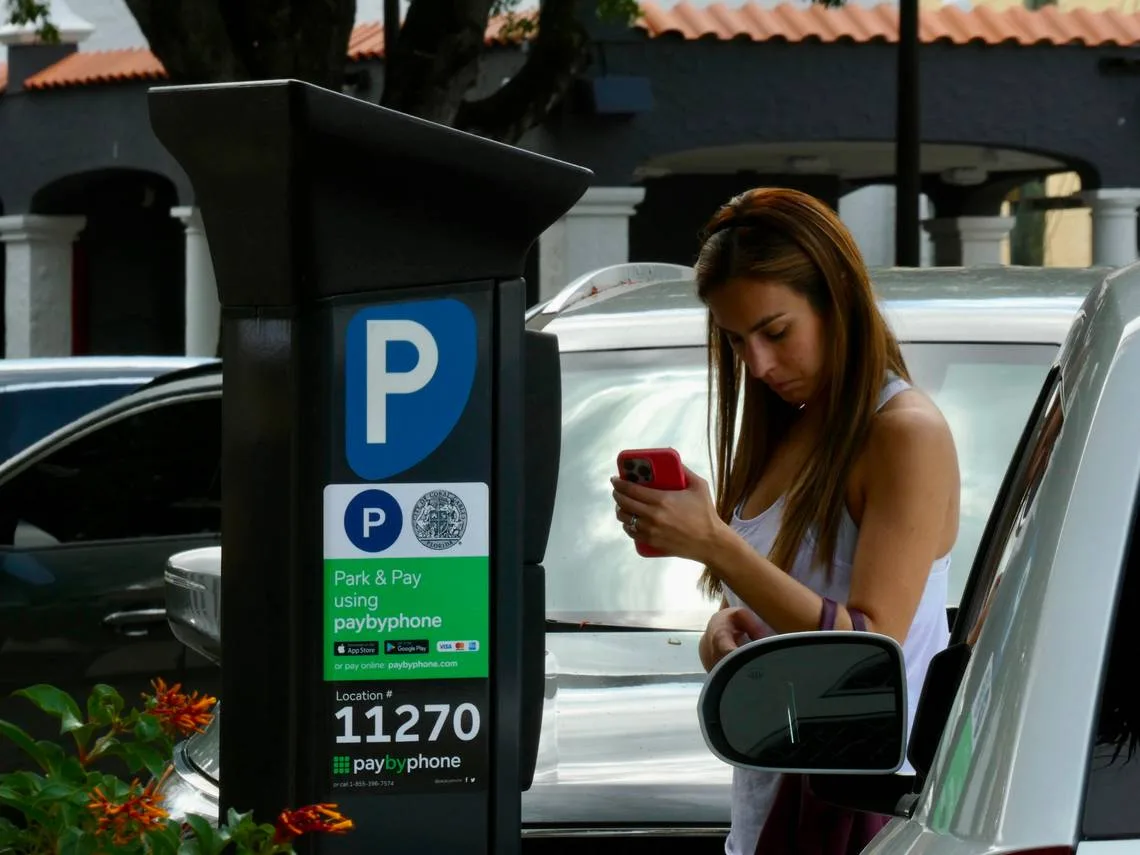Travel Planner App Market to Total USD 1,445.1 Bn by 2032
Introduction
According to Market.us, The Travel Planner App market is projected to reach around USD 1,445.1 Billion by 2032, indicating a robust CAGR of 11.90% during the forecast period from 2023 to 2032.
The market for Travel Planner Apps is experiencing a notable expansion, driven largely by the widespread adoption of smartphones and enhanced internet connectivity worldwide. These apps offer a streamlined solution for managing travel logistics, including flight and accommodation bookings, alongside offering personalized travel suggestions. This convenience aligns well with the modern traveler’s desire for a seamless planning experience, propelling the popularity of such applications.
Opportunities within this market are abundant, particularly as preferences shift towards individualized and experience-focused travel, especially among younger generations like millennials and Generation Z. The integration of advanced technologies such as artificial intelligence (AI) and machine learning (ML) promises to elevate the level of customization available, making travel planning even more tailored and intuitive.

Collaborating with local tourism entities and businesses could provide additional content and revenue channels, enhancing the overall user journey. With the gradual lifting of travel restrictions and a resurgence in tourism, the demand for Travel Planner Apps is poised for further growth, presenting a promising outlook for this sector.
Key Takeaways
- The Travel Planner App market is projected to reach approximately USD 1,445.1 Billion by 2032, with a strong Compound Annual Growth Rate (CAGR) of 11.90% during the forecast period from 2023 to 2032.
- In 2022, the transportation segment held the highest market revenue share at 41.2%, followed by travel accommodation and vacation packages segments.
- The international segment dominated the market growth, capturing 58% of the market share in 2022, with the domestic segment anticipated to witness faster growth during the forecast period.
- Europe currently leads the global travel planner app market, accounting for a substantial revenue share of 38.5%, followed by North America and Asia-Pacific.
- In 2023, over 60% of travelers used a travel planner app for booking their flights, hotels, or activities. These apps have made organizing trips much simpler.
- Downloads for the top 10 travel planner apps on the App Store and Google Play Store surged by 28% in 2023. This shows that more people are finding value in the ease these apps provide.
- A survey conducted by TripAdvisor revealed that 75% of travelers in 2023 found travel planner apps useful for discovering new destinations and activities. These apps are fueling the urge to travel.
- The implementation of artificial intelligence (AI) and machine learning in these apps increased by 35% in 2023, helping to tailor recommendations more closely to individual tastes.
- In 2023, over 45% of users interacted with social sharing and review features within travel planner apps. Sharing your travel experiences has become a key part of the adventure.
- The use of augmented reality (AR) and virtual reality (VR) in these apps for providing virtual tours and immersive experiences rose by 22% in 2023.
- A report by Expedia found that 68% of travelers in 2023 preferred using a single app for all their travel planning needs. It’s clear that a one-stop solution is highly valued for saving time.
- Revenue from in-app purchases and premium features in travel planner apps grew by 30% compared to the previous year. It indicates that users are willing to invest in features that enhance their travel planning experience.
- By the end of 2024, it’s estimated that over 55% of travel planner apps will include built-in language translation features, catering to the needs of international travelers.
Emerging Trends
Emerging trends in the travel planner app market are shaping the future of how we plan and experience our journeys. With advancements in technology and changing traveler expectations, these trends are set to redefine the travel landscape:
- Personalization through AI and Machine Learning: The use of artificial intelligence (AI) and machine learning is becoming increasingly sophisticated, allowing for highly personalized travel recommendations based on past behaviors, preferences, and real-time data analysis. This means travelers can expect suggestions that feel tailor-made for their interests and needs.
- Sustainable Travel Options: There’s a growing emphasis on sustainable travel, with apps incorporating features that help users make eco-friendly choices. Whether it’s suggesting carbon offsetting options for flights or highlighting eco-conscious accommodations and activities, these apps are making it easier for travelers to reduce their environmental footprint.
- Augmented Reality (AR) and Virtual Reality (VR): AR and VR technologies are enhancing the pre-travel experience, offering virtual tours of destinations, accommodations, and attractions. This immersive approach helps travelers make informed decisions and builds excitement for their upcoming trips.
- Integration of Social Features: More travel planner apps are incorporating social features, allowing users to share their itineraries, experiences, and reviews directly within the app. This fosters a community of travelers who can offer advice, recommendations, and inspiration to one another.
- One-stop-shop Solutions: Travelers increasingly prefer apps that can handle all aspects of travel planning, from flights and accommodations to local transportation and activities. This convenience is driving the development of comprehensive platforms that serve as a single point of contact for all travel-related needs.
- Voice and Chatbot Interfaces: Voice-activated assistants and chatbots are making travel planning more accessible and conversational. These interfaces can provide quick answers to travel queries, assist with bookings, and offer 24/7 customer support, enhancing the user experience.
Use Cases of Travel Planner App
The Travel Planner App market encompasses a wide range of use cases that cater to the needs of travelers in various aspects of their journey. These use cases include:
- Trip Planning and Itinerary Creation: Travel Planner Apps assist users in planning their trips by providing features to search for destinations, attractions, and accommodations. Users can create personalized itineraries by adding activities, sightseeing spots, and restaurants, ensuring a well-organized travel experience.
- Travel Booking and Reservations: Many Travel Planner Apps allow users to book flights, hotels, rental cars, and other travel services directly within the app. These apps provide a convenient platform for users to compare prices, read reviews, and make secure reservations, simplifying the booking process.
- Destination Exploration and Recommendations: Travel Planner Apps offer features that help users discover new destinations and explore their options. These apps provide information about popular attractions, landmarks, local experiences, and hidden gems. They may also offer personalized recommendations based on user preferences and past travel history.
- Travel Budgeting and Expense Tracking: Some Travel Planner Apps offer budgeting tools to help users plan and manage their travel expenses. These apps enable users to set budgets for various categories like accommodation, food, transportation, and activities. They may also allow users to track their spending and receive alerts when they exceed their budget limits.
- Real-time Travel Updates and Alerts: Travel Planner Apps provide users with real-time information about flights, train schedules, traffic conditions, and weather updates. Users can receive alerts and notifications regarding delays, cancellations, gate changes, or any other relevant travel information, ensuring they stay informed throughout their journey.
- Travel Guides and Local Insights: Travel Planner Apps often include travel guides with detailed information about destinations, including local customs, culture, language, safety tips, and transportation options. These guides offer valuable insights to help users navigate and immerse themselves in the local culture more effectively.
Recent Developments
- In August 2023, Google Trip introduced a new feature called “Hotel Price Forecast,” leveraging the power of artificial intelligence (AI). This feature utilizes AI algorithms to predict hotel price fluctuations and recommends the optimal booking times to users. By analyzing historical data and market trends, Google Trip aims to assist travelers in securing the best possible hotel deals and maximizing their savings.
- Around the same time, in May 2023, MakeMyTrip, a popular travel planning platform, announced a strategic partnership with Visa. This collaboration enabled MakeMyTrip to integrate in-app visa facilitation services, streamlining the travel planning process for its users. With this new feature, travelers can conveniently apply for visas without leaving the MakeMyTrip app, making the visa application process more seamless and hassle-free.
Top 7 Vendors
- Skyscanner Ltd.: Skyscanner is a leading travel planner app that allows users to search and compare prices for flights, hotels, and car rentals. It provides personalized recommendations and real-time updates on travel deals.
- Expedia Group, Inc.: Expedia offers a comprehensive travel planner app that enables users to book flights, hotels, vacation packages, and activities. It also provides travel guides, reviews, and customer support services.
- Google Trip: Google Trip is a popular travel planner app that integrates with Google services, offering users personalized trip suggestions, itinerary management, and real-time travel information. It provides recommendations for attractions, restaurants, and local experiences.
- Concur Technologies, Inc.: Concur is a travel management company that offers a travel planner app for businesses. It helps streamline corporate travel by providing expense management, booking tools, and policy compliance features.
- Airbnb, Inc.: While primarily known as a platform for accommodation rentals, Airbnb also offers a travel planner app. It allows users to discover unique accommodations, plan experiences, and connect with local hosts.
- TripAdvisor LLC: TripAdvisor offers a travel planner app that provides users with reviews, ratings, and recommendations for hotels, restaurants, attractions, and more. It also allows users to book accommodations and flights.
- MakeMyTrip Limited: MakeMyTrip is a prominent online travel agency in India that offers a travel planner app. It enables users to book flights, hotels, holiday packages, and activities, along with providing travel guides and customer support.
Conclusion
In conclusion, the travel planner app market is driven by the increasing popularity of travel, smartphone adoption, and the demand for seamless and personalized experiences. The market offers opportunities for technological advancements, partnerships, and community engagement. By leveraging AI, AR, and user-generated content, travel planner apps have the potential to transform the way people plan and experience their trips, providing them with convenient, personalized, and memorable travel experiences.



